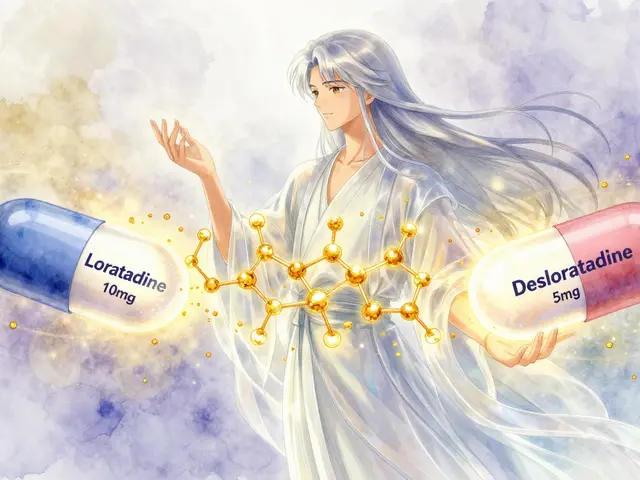
Steroid Alternative Advisor
Find Your Best Prednisone Alternative
Answer these questions to get personalized treatment recommendations based on your condition, side effects, and treatment duration.
When your doctor prescribes Deltasone - which is just another name for Prednisone - you might feel confused. Why this drug? Are there safer or cheaper options? You’re not alone. Thousands of people in New Zealand, the US, and beyond take Prednisone every year for inflammation, autoimmune conditions, or allergies. But it’s not the only option. And not everyone tolerates it well.
What is Prednisone (Deltasone) really doing in your body?
Prednisone is a synthetic corticosteroid. It mimics cortisol, the natural hormone your adrenal glands make to manage stress, reduce inflammation, and calm your immune system. Deltasone is simply the brand name for generic Prednisone. Both work the same way: they suppress overactive immune responses.
Doctors use it for conditions like:
- Rheumatoid arthritis
- Asthma flare-ups
- Severe allergic reactions
- Multiple sclerosis relapses
- Some types of cancer (as part of chemo regimens)
- Inflammatory bowel disease (Crohn’s, ulcerative colitis)
But here’s the catch: Prednisone doesn’t just target the problem area. It affects your whole body. That’s why side effects like weight gain, mood swings, high blood sugar, and bone thinning are common - especially with long-term use.
Why look for alternatives?
If you’ve been on Prednisone for more than a few weeks, you’ve probably noticed some of these:
- Insomnia or night sweats
- Increased appetite and belly fat
- Acne or thinning skin
- Mood swings or anxiety
- High blood pressure or glucose levels
These aren’t just annoying - they can be dangerous. Long-term use increases your risk of osteoporosis, cataracts, and even heart disease. Many patients stop taking Prednisone not because it doesn’t work, but because the side effects feel worse than the original condition.
That’s why doctors now look for alternatives - drugs that do the same job with fewer risks.
Alternative 1: Methylprednisolone (Medrol)
Methylprednisolone is very similar to Prednisone - it’s another corticosteroid. But it’s slightly stronger and has a shorter half-life. That means it clears your system faster.
Why choose it?
- Often used for short bursts (like 5-day packs for asthma or allergies)
- May cause less fluid retention than Prednisone
- Available as tablets, injections, or IV infusions
But here’s the trade-off: because it’s stronger, the side effects can hit harder if you take it too long. It’s not a magic fix - just a different tool.
Alternative 2: Hydrocortisone
Hydrocortisone is the closest thing to your body’s natural cortisol. It’s weaker than Prednisone, so it’s not used for severe inflammation. But it’s perfect for mild conditions.
Common uses:
- Adrenal insufficiency (Addison’s disease)
- Mild eczema or skin rashes (topical form)
- Allergic reactions where you need a gentle steroid
It’s often prescribed to patients who need long-term steroid therapy but can’t handle the side effects of stronger ones. If your condition is stable and not aggressive, Hydrocortisone might be enough - with far fewer risks.

Alternative 3: Budesonide (Pulmicort, Entocort)
Budesonide is a game-changer for people with asthma or inflammatory bowel disease. Unlike Prednisone, it’s designed to work locally - in your lungs or gut - and then break down quickly in your liver. This means less of it enters your bloodstream.
Here’s what that means for you:
- For asthma: Inhaled Budesonide reduces flare-ups without the weight gain or blood sugar spikes
- For Crohn’s disease: Entocort targets the ileum (lower intestine) with minimal systemic exposure
- Side effects are dramatically lower - especially bone and metabolic risks
It’s not a replacement for every Prednisone prescription, but for targeted conditions, it’s often the first choice now.
Alternative 4: Non-steroidal options: DMARDs and Biologics
If you’re on Prednisone for rheumatoid arthritis or lupus, you’re probably not meant to stay on it forever. That’s where disease-modifying drugs come in.
DMARDs (Disease-Modifying Antirheumatic Drugs) like Methotrexate, Sulfasalazine, or Leflunomide work slower - weeks to months - but they change the course of autoimmune disease. They reduce joint damage and can let you stop Prednisone entirely.
Biologics like Adalimumab (Humira), Etanercept (Enbrel), or Rituximab (Rituxan) are even more targeted. They block specific parts of your immune system that cause inflammation. These are expensive, but for many, they’re life-changing.
One 2023 study in the Annals of the Rheumatic Diseases found that patients with rheumatoid arthritis who switched from long-term Prednisone to Methotrexate + a biologic had:
- 47% fewer flare-ups
- 32% less joint damage on X-rays
- Significantly lower rates of bone fractures and diabetes
These aren’t quick fixes. But they’re the real solution for chronic conditions.
Alternative 5: Natural and supportive approaches
Some people ask: “Can I replace Prednisone with turmeric, fish oil, or CBD?”
The short answer: no. Not as a direct replacement. But they can help reduce inflammation and lower your steroid dose.
Research shows:
- Omega-3 fatty acids (fish oil) reduce CRP - a marker of inflammation - by up to 25% in some studies
- Turmeric (curcumin) has mild anti-inflammatory effects, especially for arthritis
- Vitamin D deficiency is linked to worse autoimmune outcomes - correcting it helps your body respond better to treatment
These aren’t drugs. But when combined with medical treatment, they reduce your need for high-dose steroids. Many rheumatologists now recommend them as part of a full plan.

How to decide which alternative is right for you
There’s no one-size-fits-all. Your choice depends on:
- Your condition: Is it asthma, arthritis, or a skin rash?
- How long you’ve been on Prednisone: Short-term? Long-term?
- Your side effects: Are you gaining weight? Struggling with blood sugar?
- Your budget: Biologics cost thousands per year. Budesonide is cheaper. Hydrocortisone is often covered fully.
Here’s a quick guide:
| Drug | Strength | Best For | Common Side Effects | Long-Term Safety |
|---|---|---|---|---|
| Prednisone (Deltasone) | High | Severe inflammation, emergencies | Weight gain, high blood sugar, mood swings, bone loss | Poor - risks increase after 3 months |
| Methylprednisolone | High | Short bursts, IV treatment | Same as Prednisone, slightly more fluid retention | Poor - not meant for long use |
| Hydrocortisone | Low | Mild conditions, adrenal support | Mild acne, fatigue | Good - safest for chronic use |
| Budesonide | Moderate | Asthma, Crohn’s (localized) | Sore throat, hoarseness | Very good - minimal systemic impact |
| Methotrexate | Low (slow-acting) | Autoimmune diseases (RA, lupus) | Nausea, liver stress, mouth sores | Good - reduces steroid need |
| Biologics (e.g., Humira) | Highly targeted | Severe autoimmune disease | Infection risk, injection site reactions | Good - effective long-term with monitoring |
What to ask your doctor
If you’re on Prednisone and thinking about alternatives, don’t wait until side effects get bad. Ask these questions:
- “Is this the lowest dose I can stay on?”
- “Is there a targeted therapy like Budesonide that could replace this?”
- “Could a DMARD or biologic help me get off steroids completely?”
- “What are the risks if I stay on this for another 6 months?”
- “Can we try reducing my dose slowly while adding another treatment?”
Many doctors still default to Prednisone because it’s cheap and fast. But guidelines have changed. The American College of Rheumatology now recommends minimizing steroid use whenever possible.
When not to stop Prednisone
Important: Never quit Prednisone cold turkey. Your body stops making its own cortisol if you take it for more than a few weeks. Stopping suddenly can cause adrenal crisis - low blood pressure, vomiting, confusion, even death.
Always taper under medical supervision. Your doctor will slowly lower your dose over weeks or months. If you feel dizzy, weak, or nauseous during tapering, call your doctor. That’s your body asking for help.
Final thoughts
Prednisone is powerful. It saves lives. But it’s not a long-term solution for most people. The good news? There are smarter, safer ways to manage inflammation today.
Budesonide for asthma. Methotrexate for arthritis. Hydrocortisone for mild cases. Biologics for severe autoimmune disease. And lifestyle changes to support it all.
You don’t have to live with the side effects. Talk to your doctor. Ask about alternatives. Your body will thank you.
Can I switch from Deltasone to a natural remedy like turmeric?
No, turmeric or other natural supplements cannot replace Prednisone for serious conditions like autoimmune disease or severe asthma. They may help reduce inflammation slightly, but they don’t suppress the immune system like steroids do. Using them instead of prescribed medication can be dangerous. However, they can be safely added to your treatment plan to help lower your steroid dose over time - always under medical supervision.
Is Budesonide better than Prednisone for asthma?
For most people with persistent asthma, yes. Inhaled Budesonide targets the lungs directly and has minimal effect on the rest of your body. It reduces flare-ups just as well as oral Prednisone but without the weight gain, blood sugar spikes, or bone loss. It’s now the first-line maintenance treatment for asthma in most guidelines, including those in New Zealand and the UK.
How long can I safely take Prednisone?
Short-term use (up to 2 weeks) is generally safe. Beyond that, risks like osteoporosis, diabetes, and cataracts increase. Most doctors aim to keep patients on Prednisone for less than 3 months. If you need longer treatment, they’ll try to switch you to a safer alternative like Budesonide or a DMARD. Never take it for more than 6 months without a clear plan to taper off.
Are there cheaper alternatives to Deltasone?
Yes. Generic Prednisone is already very affordable - often under $10 for a 30-day supply in New Zealand. But if you’re looking for alternatives with fewer side effects, Hydrocortisone and Budesonide are also low-cost and widely covered by public health systems. Biologics and DMARDs are more expensive, but they can reduce your overall healthcare costs by preventing hospital visits and complications from long-term steroid use.
What happens if I stop Prednisone too quickly?
Stopping suddenly can trigger adrenal insufficiency - your body can’t produce enough cortisol after being suppressed by the drug. Symptoms include extreme fatigue, dizziness, nausea, low blood pressure, and confusion. In severe cases, it can lead to shock or death. Always follow a gradual tapering schedule approved by your doctor. Never adjust your dose without medical advice.





Rachel Harrison
October 28, 2025 AT 22:07Just got off prednisone after 4 months for my RA. Budesonide inhaler saved my life literally. No more moon face, no more insomnia, and I can finally sleep through the night. 🙌
Tiffanie Doyle
October 30, 2025 AT 19:15OMG YES I’M SO GLAD THIS POST EXISTS 😭 I was on prednisone for 6 months and gained 30 lbs, started having panic attacks, and my skin looked like a potato chip. Switched to methotrexate + fish oil and I feel human again. Turmeric isn’t magic but it helps with the joint ache 💪
james landon
October 31, 2025 AT 08:07Why does everyone act like prednisone is the devil? It’s a miracle drug. If you can’t handle the side effects maybe you shouldn’t be sick in the first place. 🤷♂️
Jenn Clark
November 1, 2025 AT 01:17I’m a nurse and see this every day. Patients are terrified of stopping prednisone, but they don’t know how many safer options exist now. Budesonide for asthma? Game changer. DMARDs for RA? Life-changing. It’s not about fear-it’s about education.
L Walker
November 1, 2025 AT 18:18Interesting breakdown, though I’d argue hydrocortisone isn’t always ‘safest’ for chronic use - adrenal suppression still occurs, even at low doses. The real win is localized delivery: inhaled, topical, or enteral. Systemic steroids are a blunt instrument - we’ve known this for decades.
giri pranata
November 1, 2025 AT 21:28From India - here, prednisone is cheap and everywhere. But we don’t have access to biologics unless you’re rich. Still, even with limited options, doctors here are slowly moving toward methotrexate first. Hope this info reaches more people. 🙏
Kent Anhari
November 2, 2025 AT 19:24My rheumatologist told me to try budesonide for my Crohn’s. I was skeptical. Two months later, my colon is calm, I’m not bloated, and I haven’t gained a pound. Why isn’t this the default? Why do we still start with the nuclear option?
Charlos Thompson
November 4, 2025 AT 04:54Oh wow, so we’re now recommending ‘natural remedies’ like turmeric to replace a life-saving corticosteroid? Next you’ll tell me to gargle salt water for lupus nephritis. Brilliant. 🙃
Peter Feldges
November 5, 2025 AT 11:01While I appreciate the clinical nuance, I must respectfully note that the term ‘natural remedy’ is scientifically misleading. Curcumin exhibits PPAR-gamma agonism and COX-2 inhibition - mechanisms distinct from glucocorticoid receptor modulation. It’s adjunctive, not alternative. The framing here risks therapeutic nihilism.
Richard Kang
November 6, 2025 AT 18:47Okay but have you tried CBD oil?? I stopped prednisone cold turkey and now I’m on 20mg CBD daily and my joints feel like new!! My doctor said I’m crazy but my pain is GONE!! I’m living my best life now!! 😍🔥
Rohit Nair
November 7, 2025 AT 19:36Been on hydrocortisone for adrenal fatigue for 3 years. It’s not glamorous, but it’s quiet. No weight gain, no mood swings. Just… steady. People think it’s weak, but sometimes gentle wins the race. 🌿
Wendy Stanford
November 9, 2025 AT 08:34It’s fascinating how we’ve pathologized inflammation as something to be eradicated, rather than understood as a biological signal. Prednisone doesn’t cure - it suppresses. And suppression, over time, creates dependency. But what if the body isn’t broken? What if it’s screaming for rest, for food, for safety? We treat symptoms like enemies, not messengers. And in doing so, we become the very system that makes people sick - pharmaceutical, hierarchical, and disconnected from the self. We’re not treating disease. We’re managing the consequences of a culture that ignores the soul’s need for stillness.